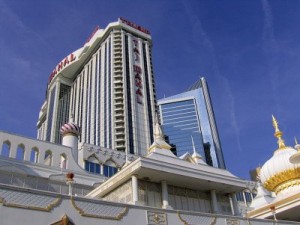Being the most inept casino developer in American history (four bankruptcies speak for themselves) has its advantages. The red ink hemorrhaged by Donald Trump‘s Atlantic City casinos spilled over onto his 1995 income-tax form, enabling the mogul to record a  $916 million loss. Yes, $916 million. These are epic numbers, not seen again until Caesars Entertainment lost billions a year during the Great Recession. But don’t cry for Trump: He could have potentially enjoyed an 18-year tax holiday, riding the wave of all that red ink, thanks to a loophole in Clinton Era tax laws. Regular shareholders, meanwhile, were seeing Trump casino stock once worth $35.50/share fall to penny-stock levels. If Trump’s own stock portfolio was suffering, he could salve himself with the knowledge that the multimillion-dollar salary he was paying himself as casino chairman was all going straight into the bank, do not pass “Go,” do not pay taxes.
$916 million loss. Yes, $916 million. These are epic numbers, not seen again until Caesars Entertainment lost billions a year during the Great Recession. But don’t cry for Trump: He could have potentially enjoyed an 18-year tax holiday, riding the wave of all that red ink, thanks to a loophole in Clinton Era tax laws. Regular shareholders, meanwhile, were seeing Trump casino stock once worth $35.50/share fall to penny-stock levels. If Trump’s own stock portfolio was suffering, he could salve himself with the knowledge that the multimillion-dollar salary he was paying himself as casino chairman was all going straight into the bank, do not pass “Go,” do not pay taxes.
Displaying a mastery of understatement, New York University academic Joel Rosenfeld, studied the 1995 form and declared, “He has a vast benefit from his destruction.” One of Trump’s minions, characteristically, threatened to sue over the disclosure. At the same time, another lackey took pride in the revelation, saying, “Mr. Trump knows the tax code far better than anyone who has ever run for President” — evidently! — “and he is the only one that knows how to fix it.” What’s more, the fragmentary returns have been validated by Trump’s former tax preparer, Jack Mitnick. They represent the tip of the Trump tax iceberg, but what a tip it is! Deep within the New York Times scoop you will find the technical explanation (“net operating loss”) whereby Trump was able to play the tax laws like a glittering golden harp.
The bottom line is that what was bad for Trump’s casinos was ultimately good for The  Donald himself. Trump Taj Mahal lost $25.5 million in the first half of 1990 alone and Trump’s Castle (now the Golden Nugget Atlantic City) posted a full-year loss of $43.5 million. Even New Jersey casino regulators, normally very protective of Trump, had to conclude that his firm was “in dire financial straits.” As with the 1995 wipeout, losses of this magnitude would have translated into a tax holiday for Trump. At the time, the New Jersey Casino Control Commission reported that Trump’s $3.6 billion in assets were offset by $3.4 billion in liabilities. Even then, Trump was no stranger to the dross-into-gold tax alchemy he perfected in the 1990s. As far back as 1978 and ’79, we was using losses of $406,379 and $3,443,560 to erase his income-tax obligation.
Donald himself. Trump Taj Mahal lost $25.5 million in the first half of 1990 alone and Trump’s Castle (now the Golden Nugget Atlantic City) posted a full-year loss of $43.5 million. Even New Jersey casino regulators, normally very protective of Trump, had to conclude that his firm was “in dire financial straits.” As with the 1995 wipeout, losses of this magnitude would have translated into a tax holiday for Trump. At the time, the New Jersey Casino Control Commission reported that Trump’s $3.6 billion in assets were offset by $3.4 billion in liabilities. Even then, Trump was no stranger to the dross-into-gold tax alchemy he perfected in the 1990s. As far back as 1978 and ’79, we was using losses of $406,379 and $3,443,560 to erase his income-tax obligation.
Although he would have to appear to have juggled the books with virtuosic dexterity, most of the credit goes to Mitnick, who said both Fred Trump (Donald’s father) and Ivana Trump were much more concerned with the nuts and bolts of the tax-filing process than was Donald. Still, Mitnick said, “He knew we could use the tax code to protect him … This may have had a couple extra digits compared to someone else’s operation, but they all benefited in the same way.” Even going on the little we know to date, Trump’s ineptitude as a casino operator was ultimately far more lucrative to him than we ever suspected. There ought to be an award for that.
* While August’s debut of Wynn Palace produced little more than a dead-cat bounce in Macao, the combined impact of it and Parisian in September translated into a 7% gain.  J.P. Morgan analyst Joseph Greff discounted the new-megaresort effect and attributed the turnaround to revived VIP play, although “we don’t necessarily view this contribution as sustainable.” He thinks VIP play will remain strong through Golden Week into October, although this month brings the state visit of Premier Li Keqiang, who is expected to be a party pooper. Deutsche Bank analyst Carlo Santarelli called the September numbers an “upside surprise” and was more inclined to credit the new resort product with driving business. Noting that Parisian was only open 18 days last month, he forecasts a 7.5% ascent next month, now that the market capacity is at full strength.
J.P. Morgan analyst Joseph Greff discounted the new-megaresort effect and attributed the turnaround to revived VIP play, although “we don’t necessarily view this contribution as sustainable.” He thinks VIP play will remain strong through Golden Week into October, although this month brings the state visit of Premier Li Keqiang, who is expected to be a party pooper. Deutsche Bank analyst Carlo Santarelli called the September numbers an “upside surprise” and was more inclined to credit the new resort product with driving business. Noting that Parisian was only open 18 days last month, he forecasts a 7.5% ascent next month, now that the market capacity is at full strength.


He also used the public company to purchase his privately owned casino (Trump Castle at the time) at an inflated purchase price, billed the same company for use of his name and expensed his jet to it too. While his casinos took a bath, he was floating just fine!
It’s pretty obvious that you dislike Trump greatly, however you are holding him to the fire for doing what we ALL do. Take whatever advantages we can with the tax code. I live in CA. My taxes for income after deductions is 53.8%. That’s right, over half. You can be a socialist and complain that that is only fair, or you can be a capitalist and claim that giving half is way, way too much. Trump did what we ALL would have done, regardless of what you would tell your friends. Fair share = how much those that make little can get from you. As for Hillary, I do not see you jumping on her for her many misdeeds, or what a “Hillary” future holds. Her foundation is strictly there for her to live like the queen she is in style, and not pay taxes either. Besides getting the rest of the world to donate to her and Bill’s lifestyle. The bias is in caps here.
I support neither candidate although my distaste for Trump dates back 20-plus years. Clinton’s connection to gambling doesn’t extend past being unable to decide whether she favors it or not.